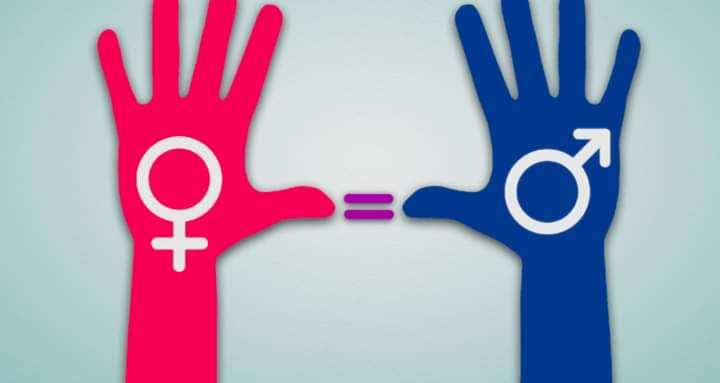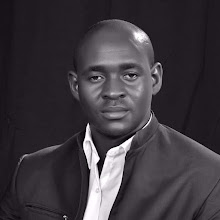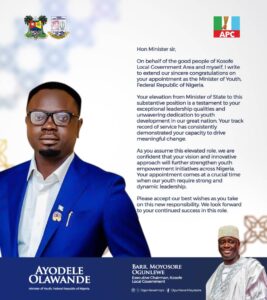
Without closing the gender gap, we will continue with, in the words of Andre Gunder Frank, “growth without development”, as well as the “development of underdevelopment”.
Affirmative action must start from the ward level up. Posts sharing must produce more female secretaries, legal advisers, and many more, from the ward level to the national level. There are more female registered voters and more women turn out to vote on Election Day. We must leverage on this and stop playing the role of extras in someone else’s movie. It is from such a struggle that we will get gender parity in the Executive, as commissioners, ministers, board members, etc.
Women have been unfairly treated in the exposition of the political history of Nigeria. Our history has been written largely by men. There are descriptions of the valiant role played by women in the Aba women’s riot, but the chronology of their activism has been relegated. Mercifully, the outstanding roles of Funmilayo Ransome Kuti, as an emancipator and activist, have not been airbrushed out of the history of the nationalist struggle against colonial rule. Margaret Ekpo, the first female senator in the First Republic, and Iyalode Wuraola Ẹsan, the first female member of the Nigerian National Assembly, have been correctly applauded as superb mobilisers and strategists. Mrs Ẹsan and Ekpo blazed the trail in the sixties, since then women are still grossly underrepresented in the Senate, and the legislative houses, at every level. It bears no telling that as women, we still have a long row to hoe.
To understand our predicament, we have to look into our political economy. Politics in Nigeria is non-ideological, monetised through the weaponisation of poverty, and epitomised by vote buying and acts that disenfranchise women. These are facts that put women at a disadvantage. Economically, we are already disadvantaged. We do not have access to large caches of cash, like men. In addition, the political parties do not have the ideological anchors that are assuring enough to promote affirmative action for women. Without question, there is the patriarchal domination of our politics. All things considered, the benefits of money, power and privilege are in the hands of men. Therefore, giving women a chance is a challenge to patriarchy and its privileges.
My people, the statistics bear witness and the facts are incontrovertible – Nigeria is not making concerted efforts at closing the gender gap in the political arena. It can be argued that a greater effort is manifesting in the corporate sector. Women CEOs in hitherto forbidden territories, such as the financial services, are becoming increasingly common. Membership in corporate boards are looking more representative and diverse, but gender disparity in politics sticks out like a sore thumb. Even though we now have female CEOs of banks, no one is really going to be so daring as to bet the ranch on the emergence of female governors next year. How about a female Senate President, the President of the Republic of Nigeria? Perish the thought. At this point, I will like to give some credit to my leader, our own Arakunrin Oluwarotimi Odunayo Akeredolu (SAN, CON) who has given us a voice in the state by appointing the first female Secretary to the State Government, Princess Oladunni Odu, and having more women in the Executive Council. This is in addition to supporting women candidates in the party primaries. Who knows, a woman as Deputy Governor may soon be our portion. Kudos to Ekiti State, a woman has emerged as their speaker, and to former President Obasanjo who maneuvered Patricia Etteh’s short-lived tenure at the Federal House of Representatives as the speaker.
Yes! We matter! Women matter! How can there be progress, growth and development, where half of the population are deprived of opportunities? Closing the gender gap in the political set up of Nigeria matters. The country’s perennial underachievement cannot be explained, or redressed, without factoring in the gender gap. Increased female representation is key to tackling the issue. If we take a deep dive into the fundamentals, the paucity of representation has resulted in inertia.
The Two Problems
For us to become a force in politics, we must take a look at two things and change them. One, we must examine our contribution to the failure in the political arena. What is our contribution? We fail because we do not build power from the bottom up; we, women, often build power from top to bottom. Power must be organic to be sustained. No solid structural foundation is ever built from the top. Politics is about numbers and having a base. Mathematically, numbers have bases, and bases are building blocks. Men build their base throughout life. They connect the numbers from kindergarten, through primary school, secondary school, the university, Church groups, township development associations, those they play tennis with, their beer drinking buddies, and alumni associations, etc. What do we women do? Once we get to secondary school, we abandon our primary school friends. In the university, we forget those we knew from the secondary school. At every step up, we leave the steps below unattended to. No one builds power that way. No one wields influence by dealing with the present alone. The past may come with baggage but there is a lot to gain from it, to navigate the present and plan for the future. Foundations are fundamental to building anything of value and enduring. If we look around you, women who have become leaders have mastered how to build power. Learn from them.
The second problem is that political parties have managed to put us in silos. To understand this, think about the thing called “Woman Leader”. Why don’t we have “Man Leader”? Woman Leader is a clever creation of otherness. In effect, it is peripheral and a fringe label, useful as cheerleaders but not skilled enough to play. With the “Woman Leader” toga, men have created a debilitating bar on how far women can aspire within the party. To move forward, we must push for that concept to be reviewed and reinterpretated.
Does It Matter?
Yes! We matter! Women matter! How can there be progress, growth and development, where half of the population are deprived of opportunities? Closing the gender gap in the political set up of Nigeria matters. The country’s perennial underachievement cannot be explained, or redressed, without factoring in the gender gap. Increased female representation is key to tackling the issue. If we take a deep dive into the fundamentals, the paucity of representation has resulted in inertia. For example, the number of out-of-school females is staggering. Female child labour has a direct bearing on the burgeoning population growth rates, leading to increasing poverty and mass misery. Women can use true grit to promote free and compulsory education up to the age of sixteen. Aside from verified demographic studies, common sense supports the position that the more the years spent in school, the later the marriages, and the fewer the children. Increased female participation in politics will bring more issues affecting women into focus. Women elected into political office can push for the creation of women cooperatives like our dear First Lady has done, and get women better access to credit. It has been proven that women pay up loans. We are not habitual debtors like men. Most importantly, women are more effective in breaking the chains of rural poverty. Empower women and build a nation.
A rational way out is to emulate the all-female reservation of seats, as done in the United Kingdom. In Africa, Rwanda and Senegal have led the way, to the envy of all. Rwanda is the first country to create structures that advance women in all levels of leadership, not political leadership alone. The East African country amended its constitution to create gender parity. In 2010, Senegal’s 50/50 gender parity law came into force.
What Can Be Done?
A rational way out is to emulate the all-female reservation of seats, as done in the United Kingdom. In Africa, Rwanda and Senegal have led the way, to the envy of all. Rwanda is the first country to create structures that advance women in all levels of leadership, not political leadership alone. The East African country amended its constitution to create gender parity. In 2010, Senegal’s 50/50 gender parity law came into force. This has had a positive impact on the search for equity, bridging the gap between the genders, and achieving social justice. Political parties can agree, under a general democratic agreement, to have only women contesting for certain legislative seats. It does not preclude women from contesting other seats, involving men. It has been an advancement in practical application. We should consider this format.
Affirmative action must start from the ward level up. Posts sharing must produce more female secretaries, legal advisers, and many more, from the ward level to the national level. There are more female registered voters and more women turn out to vote on Election Day. We must leverage on this and stop playing the role of extras in someone else’s movie. It is from such a struggle that we will get gender parity in the Executive, as commissioners, ministers, board members, etc.
Without closing the gender gap, we will continue with, in the words of Andre Gunder Frank, “growth without development”, as well as the “development of underdevelopment”. Without engaging women, it will be difficult to move from consumption to production.
Bámidélé Adémólá-Olátéjú, an advocate, strategist and political analyst, is Commissioner for Information in Ondo State. Twitter: @BamideleUpfront; Facebook: facebook.com/Bamidele. BAO
FOR ADVERT, POLITICAL CAMPAIGN ONLINE BANNER & POSTER DISPLAY, EVENT COVERAGE, SPONSORED ARTICLE/STORY PUBLICATION, PR AND OTHER MEDIA SERVICES:
PLEASE, SEND AN EMAIL TO : citizennewsng@gmail.com












